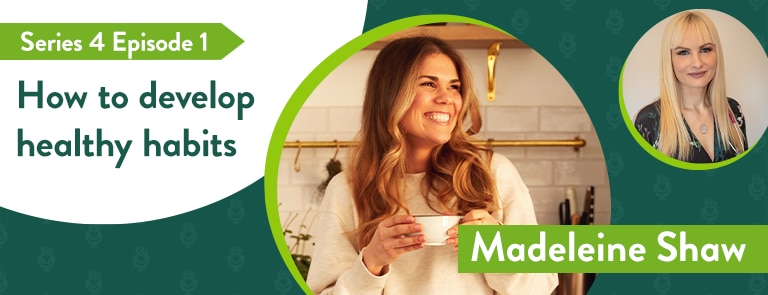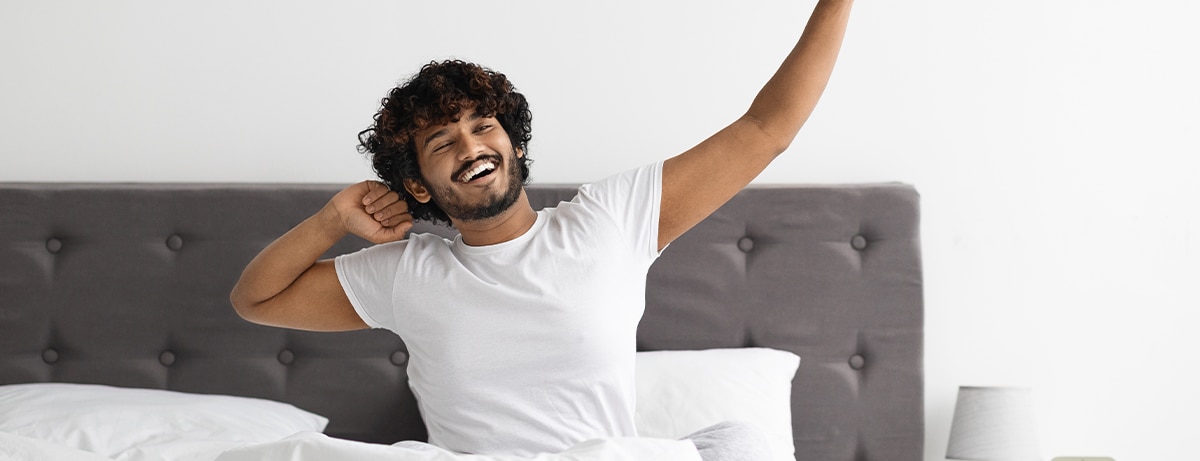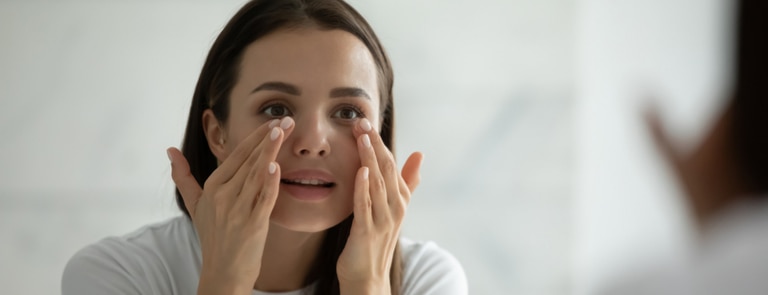10% off £35
The circadian rhythm – everything you need to know

Are you a natural ‘morning person’, or do you love a lie-in? Do you thrive on six hours’ sleep, or are you a nine-hours-a-night type?
Have you noticed this changing over the years, or have you had a similar sleep pattern for as long as you can remember?
The answers may lie in more than just your lifestyle habits. Meet your circadian rhythm.
What is the circadian rhythm?
Humans, like all living things, have a circadian rhythm. The circadian rhythm is the brain’s way of aligning the body with the environment.
It’s a set of physiological changes over a 24-hour-or-so period of time that is set by your internal body clock (we have a big one in our brains and mini ones in every cell of our bodies).
They tend to run no matter what, but our environment does have an influence on them - most specifically light is very influential. This is why we sleep when it’s dark and we are awake when it's light.
Our sleep/wake cycle follows this circadian rhythm, as does our mood-regulating hormones, our appetite-regulating hormones, and our temperature.
Our ancestors once lived by their circadian rhythm – getting up with the sun and going to sleep when darkness fell.
In modern times, however, electric lighting, technology, alarms and commuting times mean that many of us are keeping hours which might be at odds with our natural body clocks.
What controls the circadian rhythm?
Your circadian rhythm is controlled by a small area within the section at the base of your brain called the hypothalamus.1
The hypothalamus instructs the body to release certain chemicals and hormones during each 24-hour period. The timing of these releases is in-built into our body clocks - but they’re also partly influenced by external factors.
These external factors include whether it’s light or dark. The hypothalamus receives signals from the eyes when it’s dark, causing it to release melatonin – the sleep hormone – which makes you feel tired.
Light stimulates the production of cortisol – which wakes your body up and energises you for the day ahead.2
Why is the circadian rhythm important?
The circadian rhythm sets the pace for the body’s rest and repair.
Deep sleep is vital for cell regeneration. So, whenever you’re catching good quality sleep, your body is using that time to restore itself.3
Your immune system, cardiovascular system and muscles are all areas which undergo this restorative process as you sleep.
How do circadian rhythms differ?
Just like people, no two circadian rhythms are exactly the same. Circadian rhythms can also change throughout our lives.
- After birth, babies typically take a little time to adjust to the light/ dark circadian rhythm. At first, babies sleep between 12 – 16 hours of sleep in a 24-hour period, including naps. This reflects the huge amount of growth that is occurring in their bodies. Young children up to age five are beginning to synchronise with the light/ dark circadian rhythm, and should get between 10 – 14 hours, including naps.
- Teenagers need around between 8 – 10 hours of sleep.4 Teens have a developing circadian system, so they can find early starts challenging. (This isn’t just a myth!).5
- Adults over 60 can find themselves tired earlier in the evening than when they were younger. Older adults also wake up more during the night and tend to wake up early in the morning.6
What can disrupt the circadian rhythm?
A major factor which disrupts the circadian rhythm is unnatural light and the timing of our activities.
This could be electric lights in the house, a streetlight outside your bedroom window, or the glare of a TV, mobile phone or other electronic device.
The blue light which comes from electronic devices can suppress melatonin production, which can stop you feeling tired and making it more difficult to drop off to sleep at night.7
Shift work is another significant disruptor of the circadian rhythm. Irregular work schedules which include night shifts (such as those undertaken by healthcare workers) can lead to insomnia and/or excessive sleepiness.
This phenomenon has even been called shift work disorder (SWD) by scientists.8
How can I improve my circadian rhythm?
The best thing you can do for your circadian rhythm is to give it routine and predictability.
It's common for many people to believe that their early or late preferences are genetically set in stone.
This is true to a degree, but more often it is our behaviours that ‘set’ our preferences. We have more control than we think!
-
Get up at the same time every day
See waking up as a type of reset button.
If you hit it at different times each day, your body cannot regulate itself.
You can find yourself feeling groggy in the mornings when you want to feel awake, feeling low energy when you want to exercise, and having not much control over your mood or your appetite.
By contrast, do not force yourself to go to bed at the same time each day.
Every day is different and you cannot possibly control all the variables that affect how sleepy you feel.
But by waking at the same time every day you are controlling the amount of sleepiness you will have built up by the end of the day (sleep is a drive state; the longer you are awake the greater the need to sleep!).
By going to bed when you are sleepy tired, and waking up at the same time no matter what, you will start to notice that your body starts to make you sleepy around the same time each night anyway.
Dictating it whilst still lying in, snoozing etc, will only lead to anxiety and ‘wired but tired’ minds when the sleepiness does not come.
-
Exercise during the day
Physical activity can help improve sleep quality, helping you feel less drowsy in the day and drop off easier at night.9
Also, the natural daylight you get by being outside helps synchronise your circadian rhythm to the light/ dark pattern.
If you can exercise first thing as part of a morning routine with a consistent wake time and plenty of light, you are really setting your body up as best as you can for the day and night ahead.
You should notice from this consistent behaviour that your mood improves, your appetite is regulated and predictable and your sleep quality is improved.
-
No phones in the bedroom!
Or any tech or daytime activities for that matter. The bed is for sleeping.
Encouraging your brain to do daytime activities in the night will make it think you don’t want to sleep, and it will try to make you more awake so you can perform that activity better.
Also, the light levels of these activities are not helpful - especially if you have spent the evening in low levels of light, and then expose yourself to something much brighter and more concentrated in bed.
Not only are you delaying your sleep onset, but you are potentially going to disrupt the quality of your sleep to come by not allowing your brain to switch off.
-
Do you often find yourself working late?
Firstly, if you choose to do this and don’t have a natural separation between work and sleep where you can wind down, eat well and process your day, you will always be compromising on your sleep.
By consistently working late you will notice your behaviour shift your sleeping pattern to a later time period anyway.
There are blue light blocking technologies out there, but make sure to give yourself time to wind down too. Stimulating your brain with daytime activities is just as influential on your nighttime sleep as the light can be.
How to develop healthy habits with Madeleine Shaw
How to develop healthy habits with Madeleine Shaw
In this episode, we explore Madeleine's morning and evening routines, her favourite healthy snack ideas for on the go, how to meditate and why it provides so many people with comfort, plus tips on instilling healthy habits in the generation to come.


Last updated: 9 June 2022
- https://www.sleepfoundation.org/articles/what-circadian-rhyth
- https://academic.oup.com/jcem/article/86/1/151/2841140
- https://www.sleepfoundation.org/articles/what-happens-when-you-sleep
- https://www.nhlbi.nih.gov/health-topics/sleep-deprivation-and-deficiency
- https://www.ncbi.nlm.nih.gov/pmc/articles/PMC2820578/
- https://www.ncbi.nlm.nih.gov/pmc/articles/PMC4648699/
- https://www.ncbi.nlm.nih.gov/pubmed/30311830
- https://www.ncbi.nlm.nih.gov/pubmed/32074541
- https://www.livescience.com/17191-exercise-improves-sleep.html














